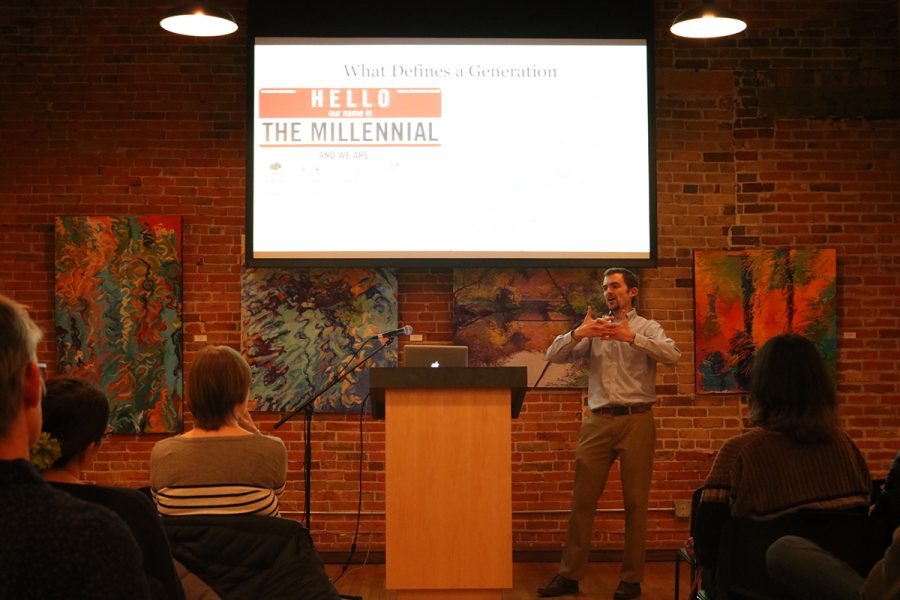UW-Eau Claire Professor Peter Hart-Brinson talks about his latest book on gay marriage at Volume One Gallery
Hart-Brinson discusses ‘The Gay Marriage Generation: LGBTQ Movement and American Culture’
More stories from Stephanie Janssen
Photo by Sam Farley
Associate Professor at UW-Eau Claire, Peter Hart-Brinson, shares his findings on the variations of public opinion on gay marriage at the Volume One Gallery.
The cozy, dimly-lit space of the Volume One Gallery functions as the perfect space for real-world topics and issues to be comfortably discussed.
Peter Hart-Brinson, sociology and communication and journalism professor at UW-Eau Claire, talked about his recently-released book, “The Gay Marriage Generation: LGBTQ Movement and American Culture,” Thursday at the Volume One Gallery.
Hart-Brinson said he really started thinking about gay marriage in 2006. A referendum on the ballot for that election year defined marriage in the state constitution as a union between one man and one woman — therefore banning gay marriage and preventing gay marriages from becoming legalized through court.
At the time, he was a teaching assistant at UW-Madison and was teaching a class called “Contemporary American Society.” He said he noticed all of the students in his class, even conservative ones, were opposed to the ban of gay marriage.
“It made me wonder whether or not there was a generational change happening,” Hart-Brinson said. “The public opinion polls at the time had showed that young people are much more supportive of gay marriage than their elders and so I wanted to investigate whether or not I could find out what was the cause of the generational shift.”
Hart-Brinson explained the generation that came of age before 1987 viewed homosexuality as a behavior, that it was commonplace to think of homosexuality as something you did or didn’t do.
When mass media started speaking in the LGBTQ community’s favor, it changed the way the Democratic party and media viewers talked about sexuality. Sexuality became understood as an identity, as a part of who someone is. Being able to express sexuality was discussed as a matter of human rights, he said.
“Why would you deny a right to someone just because of who they are, it doesn’t make sense,” Hart-Brinson said.
Hart-Brinson said his book isn’t just about gay marriage, but about how generations are defined. He said the book has two main goals: to explain the historical rise in support for gay marriage and try to rework conversations about generation.
Today, generations and generational change are labeled with terms like “Millennial,” “Generation X” and “Generation Z.” Hart-Brinson said these labels are pointless. People of all ages are in this together, he said. Generations have their differences, but also their similarities.
Hart-Brinson said he wants people to be able to think about generational change in a different way. He said he hopes that every time someone hears the word “Millennial,” they know it’s a nonsense word.
He said he wants people to have an appreciation for how society changes — society changes constantly, and sometimes in unexpected ways. The generational change in public support of gay marriage illustrates that. Hart-Brinson also said he wants people to able to see how politics and social change can unfold quickly or slowly.
Hart-Brinson said he believes, because of the undying support of young people, that gay marriage is here to stay.
“Even if the Supreme Court were to somehow overturn the ruling of legalization of gay marriage in all fifty states, I don’t think it would have any big effect because then they would have to go through the political process and with every passing year politically overturning gay marriage is less and less likely.”
During the presentation, attendees sat shoulder-to-shoulder in the gallery space.
“I found it very interesting,” Olivia Misorski, an audience member, said, “especially the part where the idea that generations’ opinions weaved together.”
Hart-Brinson’s book, “The Gay Marriage Generation: LGBTQ Movement and American Culture,” can be purchased at Volume One’s Local Store and on Amazon.
Janssen can be reached at janssess1704@uwec.edu.

